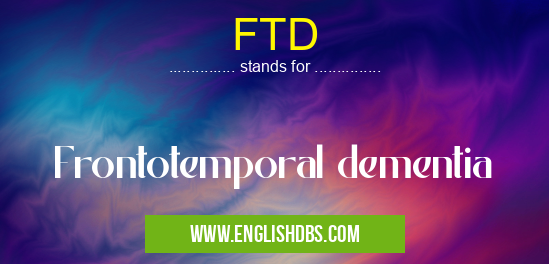What does FTD mean in BRITISH MEDICINE
FTD (Frontotemporal Dementia) is a progressive neurological disorder that primarily affects the frontal and temporal lobes of the brain. Unlike other forms of dementia that primarily impact memory, FTD primarily affects behavior, personality, and language.

FTD meaning in British Medicine in Medical
FTD mostly used in an acronym British Medicine in Category Medical that means Frontotemporal dementia
Shorthand: FTD,
Full Form: Frontotemporal dementia
For more information of "Frontotemporal dementia", see the section below.
Definition
FTD means Frontotemporal Dementia. It is a neurological disorder that affects the frontal and temporal lobes of the brain.
Causes and Symptoms
The exact cause of FTD is unknown, but it is believed to be related to abnormal accumulation of proteins in the brain. Symptoms typically begin in the 40s or 50s and may include:
- Behavioral changes: Impulsivity, disinhibition, social inappropriateness
- Personality changes: Loss of empathy, apathy, lack of motivation
- Language difficulties: Difficulty finding words, impaired comprehension
- Motor symptoms: Muscle weakness, tremors, difficulty with balance and coordination
Types of FTD
There are three main subtypes of FTD:
- Behavioral Variant (bvFTD): Characterized by significant changes in behavior and personality.
- Primary Progressive Aphasia (PPA): Characterized by severe language deficits, including difficulty with speech, reading, and writing.
- Frontotemporal Dementia with Motor Neuron Disease (FTD-MND): Combines symptoms of FTD with progressive muscle weakness due to motor neuron involvement.
Diagnosis and Treatment
Diagnosis of FTD is based on clinical evaluation, neuroimaging, and cognitive testing. There is currently no cure for FTD, but treatment focuses on managing symptoms and improving quality of life, including:
- Medications to address behavioral and cognitive symptoms
- Speech and language therapy
- Physical therapy and occupational therapy
- Support groups and counseling for patients and their families
Essential Questions and Answers on Frontotemporal dementia in "MEDICAL»BRITMEDICAL"
What is frontotemporal dementia (FTD)?
FTD is a degenerative brain disorder that affects the frontal and temporal lobes of the brain. These regions are responsible for executive functions, such as planning, organizing, and decision-making, as well as social behavior and language.
What are the symptoms of FTD?
Symptoms of FTD can vary depending on which part of the brain is affected. Common symptoms include changes in personality and behavior, difficulty with language, and problems with executive function. Other symptoms may include muscle weakness, involuntary movements, and difficulty swallowing.
What causes FTD?
The exact cause of FTD is unknown, but it is believed to be caused by a combination of genetic and environmental factors. Mutations in certain genes have been linked to FTD, and some cases may be caused by exposure to toxins or head injuries.
Is there a cure for FTD?
There is currently no cure for FTD, but treatments can help to manage the symptoms. Medications can be used to improve cognitive function, reduce agitation, and control muscle spasms. Speech and language therapy can help to improve communication skills, and physical therapy can help to maintain mobility.
What is the prognosis for FTD?
The prognosis for FTD varies depending on the type of dementia and the individual's overall health. The average life expectancy after diagnosis is 8-10 years, but some people may live for longer or shorter periods of time.
What can I do to help someone with FTD?
There are a number of things you can do to help someone with FTD. Be patient and understanding, and try to provide them with support and encouragement. Help them to maintain their independence as much as possible, and encourage them to participate in activities that they enjoy. Make sure that they are getting the necessary medical care and treatment, and be there for them to provide emotional support.
Final Words: FTD is a complex and challenging neurological disorder that affects both the individual and their loved ones. By understanding the causes, symptoms, and treatment options, we can provide better care and support to those living with FTD.
FTD also stands for: |
|
| All stands for FTD |
